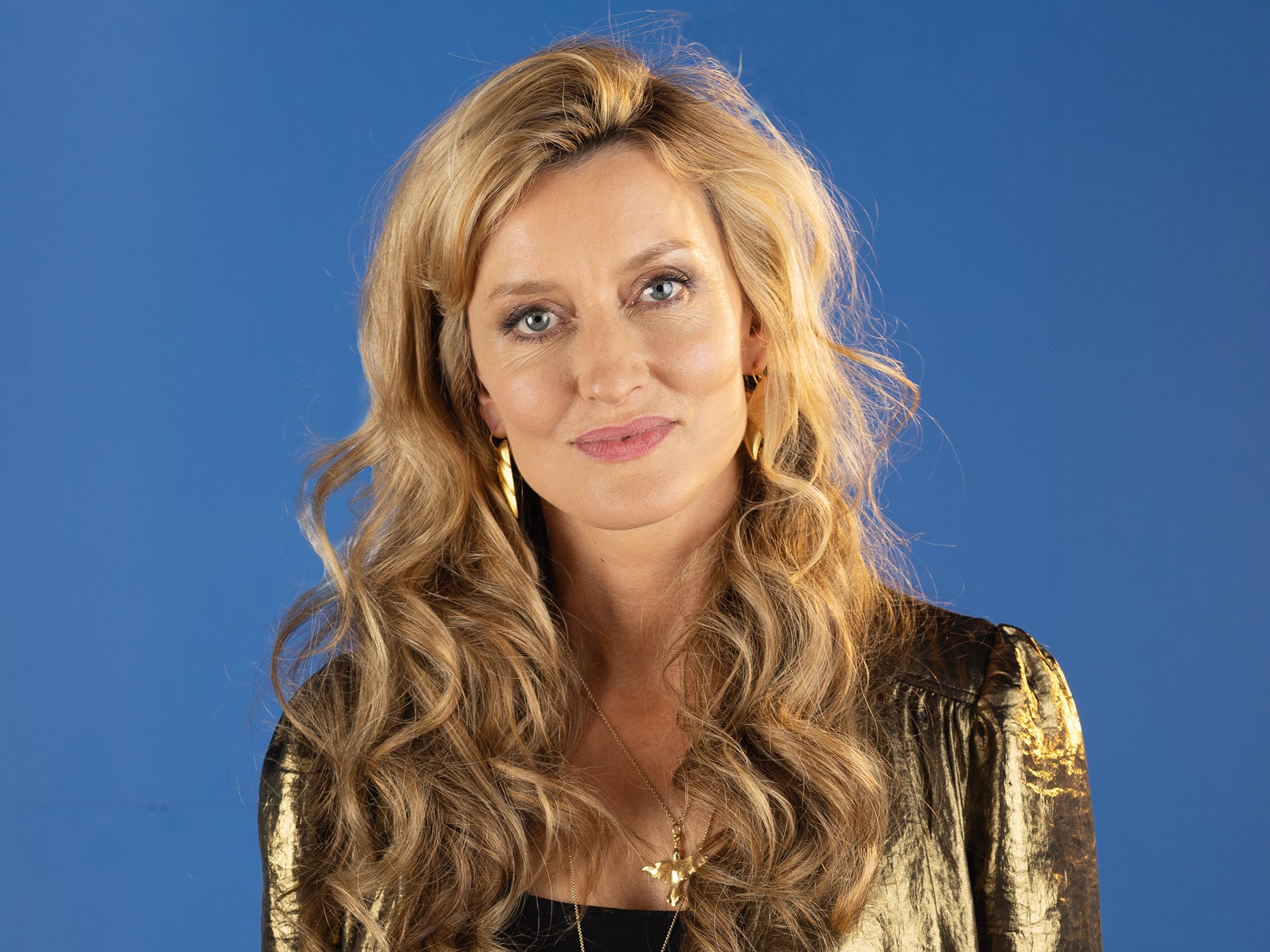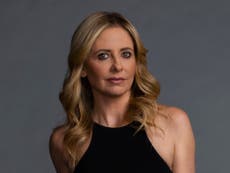‘Being a solo parent is all-consuming’: Natascha McElhone on her new career focus and that controversial relationship in The Crown
The actor talks to Fiona Sturges about her new costume drama and why she wrote a book about the tragic death of her husband


Your support helps us to tell the story
From reproductive rights to climate change to Big Tech, The Independent is on the ground when the story is developing. Whether it's investigating the financials of Elon Musk's pro-Trump PAC or producing our latest documentary, 'The A Word', which shines a light on the American women fighting for reproductive rights, we know how important it is to parse out the facts from the messaging.
At such a critical moment in US history, we need reporters on the ground. Your donation allows us to keep sending journalists to speak to both sides of the story.
The Independent is trusted by Americans across the entire political spectrum. And unlike many other quality news outlets, we choose not to lock Americans out of our reporting and analysis with paywalls. We believe quality journalism should be available to everyone, paid for by those who can afford it.
Your support makes all the difference.When Natascha McElhone got her big break as an actor, she very nearly blew it. She was fresh out of drama school and appearing in Richard III at the Open Air Theatre in London’s Regent’s Park. It was pouring with rain one evening and, though McElhone didn’t know it, the writer and director James Ivory, of Merchant Ivory fame, had come to watch the show. She had briefly met him a few weeks earlier while reading for a part in his 1996 film Surviving Picasso, a biopic of the artist told from the perspective of the painter Françoise Gilot, who was his lover for a decade. “I had gone in, read a page of the script and was immediately ushered out, so I didn’t think anything of it,” she recalls.
And so, on this rainy night, McElhone was having a post-show drink at the bar when “this older man with a debonair American accent came up and said hi. I knew one of the cast’s dads was coming in, so I rather bossily told him to go sit at the table with everyone else while I got us some mulled wine. He looked surprised and said, ‘Oh, well OK’. I eventually sat down and James, who is very shy, said, ‘You don’t remember me, do you?’” McElhone pauses and clutches her face in horror. “It all suddenly came back to me, I was mortified. But he was so sweet about it. He said, ‘Look, I want you to [play Françoise]’.”
A year later, McElhone made her big screen debut, aged just 24, opposite Anthony Hopkins as Picasso. From there, she was thrust into the Hollywood big league, landing major parts in Ronin (playing an IRA operative alongside Robert De Niro), The Truman Show (as Jim Carrey’s lost love) and the 2002 remake of Tarkovsky’s Solaris (as another lost love, this time George Clooney’s). When I ask if she quailed in that first role in front of Hopkins, then best known for his terrifying turn as Hannibal Lecter, McElhone laughs and shakes her head. “It’s a strange thing but when you’ve wanted to do something your whole life, in your imaginative hinterland [acting with a huge star] is what the job looks like. There aren’t obstacles, and reality and practicality hasn’t yet kicked in, so it made perfect sense. I just jumped on that boat and sailed away.”
McElhone, who is now 51, is talking over Zoom from Budapest where she is currently filming the second season of Halo, a big-budget space opera based on the videogame franchise about a war between humans and a confederation of aliens, in which she plays an evil scientist. She is meant to be on set, though following a weather warning, she and the crew are back at their lodgings awaiting further instructions. McElhone is warm and full of smiles, though there is a hint of steeliness beneath the soft features, a quality that has doubtless kept her going through hard times, more of which later.
First, there’s her new project, Hotel Portofino, a costume drama set in 1926 in which she plays Bella, a British expat in Italy who has married into a cash-strapped aristocratic family. Bella has spent three years renovating an Italian hotel which she hopes will bring some financial security. McElhone says the series is “the polar opposite of Halo” with its depictions of love, family and the early stirrings of fascism. “Those references [to fascism] are oblique and necessarily so, because [executive producer] Walter [Iuzzolino], who was the creative force behind it, didn’t want to make something too on-the-nose or hectoring. But there is a clear parallel between the rise of populism at the moment and that period of history, and we’ll end up exploring those themes in greater detail in future seasons. But for now, the focus is on drawing in and seducing the audience.”
That seduction comes via sun-dappled landscapes, gorgeous 1920s outfits and a young cast of dewy English roses and floppy-haired men frolicking in the sea. The vibe is Room with a View meets The Durrells, with a dash of The White Lotus. The series was filmed not in Portofino but in Croatia where the production took over a large villa: “The house is beautiful and exactly as it is in the show, with Bella’s bedroom and its little balcony looking out over the sea. We kept seeing dolphins cresting the waves. It was idyllic, a really special experience.”

For McElhone, the part of Bella comes hot on the heels of another aristocratic role, that of Penny Knatchbull, aka Countess Mountbatten of Burma, in the latest season of The Crown. As the series tells it, her friendship with the late Duke of Edinburgh – they shared a love of carriage driving – ruffled feathers within the royal family. Early on, McElhone and Jessica Hobbs, the director, discussed the relationship between Prince Philip and her character. “First of all, she was very clear that it’s a fictionalised version of that story, but secondly, it’s all about how you create these narratives,” McElhone says. “And what interested me was putting on screen a relationship between a man and a woman where perhaps it’s a ferocious friendship, and there isn’t a romantic element. In my life I have a handful of really close male friends who I’ve never had a relationship with, but you never see that on screen unless it’s the gay best friend.” McElhone was both delighted to be part of a landmark series and relieved that her role in it wasn’t central, thus allowing her to avoid the ruckus that erupts with each season over its perceived artistic licence: “It was really like doing an independent film – I would rock up in some muddy field and do some scenes with Jonathan [Pryce, who plays the Duke] and then go off again. It was brief but enormous fun.”
McElhone doesn’t recall deciding to become an actor; it was something she was born wanting to do. Journalism was the family business as she was growing up – both her late mother, Noreen Taylor, and father, Mike Taylor, were writers at the Daily Mirror, while her stepfather is Roy Greenslade, a journalist and media commentator. McElhone’s abiding memory of visiting her mother at work is of “the blue cigarette smoke hanging in the air. You’d push open the door and there would be phones ringing and people screaming and yelling at one another. It was very intoxicating.” It’s with some pride that she recalls her mother interviewing luminaries from Nelson Mandela to Muhammad Ali. “She once did a series on politicians’ wives where she flew east to west with Raisa Gorbacheva [wife of the Russian leader Mikhail Gorbachev] on a plane, and then she did the same flying west to east with Nancy Reagan [wife of the US president, Ronald Reagan]. A truly extraordinary experience.”

If McElhone can pinpoint a time when her acting ambitions came into focus, it was while at a pantomime as a young child where Greenslade knew one of the actors. “We went backstage and I was allowed to play with the props. I remember thinking that you could be an adult and still play with toys, so obviously I wanted to do that. Which, by the way, is pretty much true. Just yesterday I was playing with a medical kit and doing surgery with pretend tools made by props people.”

Watch Apple TV+ free for 7 days
New subscribers only. £8.99/mo. after free trial. Plan auto-renews until cancelled

Watch Apple TV+ free for 7 days
New subscribers only. £8.99/mo. after free trial. Plan auto-renews until cancelled
In the decade following Surviving Picasso, McElhone was flying high professionally, bouncing from one film to the next and barely coming up for air. But her life took a tragic turn in 2008 when her husband, Martin Kelly, a plastic surgeon, died from an undiagnosed heart condition at the age of 43, after being found unconscious in the doorway of their home in London. McElhone was working in LA at the time and was pregnant with their third child. She wrote Kelly’s obituary in the Mail on Sunday in which she declared herself “the luckiest woman alive, even though he’s not here”. She sent a draft to Greenslade for his approval, though he sent it straight on to the editor without reading it, telling her that if she was able to write it in such circumstances then it “must be right”.
Two years later, McElhone published After You, a heartbreaking and, on occasion, darkly humorous book detailing the year following her husband’s death. Written in the form of journal entries addressed directly to Kelly, she reveals the crushing loneliness of life without him alongside the pressures of keeping the family financially afloat and navigating the hideous bureaucracy of death. McElhone tells me, firmly but not unkindly, that she wrote the book “so I wouldn’t have to talk about it”, though she adds there were precious few books at the time for or about people in her position – “which of course is hard to believe now when you look at bookshops full of stories of people who have survived the loss of loved ones.” She read CS Lewis’s A Grief Observed and found it “brilliant, but it was by a religious man who was middle-aged and wasn’t struggling with the things that I was struggling with on a very prosaic, day-to-day, to-do list level.”
At the time of Kelly’s death, McElhone was a year into Californication, the TV comedy drama in which she played the ex-partner of David Duchovny’s feckless novelist. She did it for seven years, turning her annual stay in Los Angeles into a summer holiday for her children. McElhone lights up when talking about her boys, who are now 14, 19 and 22 (her eldest has now left home), and says every job she has taken has had to work around them and their schedules.
“You’re the frame, they’re the picture, and you keep your eyes on them,” she says of being a solo parent. “I haven’t actually worked that much [while raising them], which I know sounds strange. Over the years I’ve done a couple of shows that luckily people have watched. But I’ve also been at home for up to two years at a time. I’m not going to say I was just a stay-at-home mother because we all know it’s never ‘just’ – it’s all-consuming. But there have been long stretches where a lot of my creativity and energy have gone into my children, and joyfully so.” Now that they are older, she says she has assumed the role of “the wallpaper, [I am] the background noise. I’m glad to be irrelevant.” Which presumably leaves more time for her to concentrate on herself and her career, I suggest? Her face breaks out into a broad smile. “Oh yes, I’m definitely clamouring for work now. Bring it on.”
‘Hotel Portofino’ starts on 3 February, 9pm on ITV1 and ITVX



Join our commenting forum
Join thought-provoking conversations, follow other Independent readers and see their replies
Comments